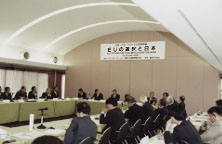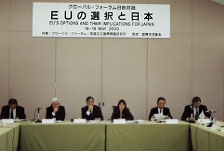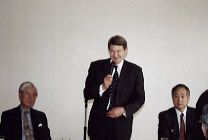International Dialogue
Summary of Dialogues
The Seventh Japan‐Europe Dialogue "EU's Options and Its Implications for Japan"
The Global Forum of Japan (GFJ) and The Royal Institute of International Affairs (RIIA) with assistance from The Japan Foundation co-sponsored the seventh Japan-Europe Dialogue in Tokyo on May 18-19, 2000. The theme of the Dialogue was "EU's Options and Its Implications for Japan". Following on from an opening dinner hosted by the GFJ Chairman, Amb. Okawara Yoshio on the evening of the 18th, there was a lively discussion between participants in both the morning and evening sessions held on the 19th. Participants spiritedly exchanging views in the morning session |
EU's Common Defense and Foreign Policy
The theme of the morning session was "EU's Common Defense and Foreign Policy" and was chaired by Prof. Ito Kenichi, the Governor and Executive Director of The Global Forum of Japan. The session began with a keynote speech by Sir Timothy Garden, former Director of The RIIA. In his speech, Sir Timothy claimed that the EU's post Cold War approach to security was still dependent upon troop forces structured within the Cold War strategic framework. This approach lacks the flexibility to counter threats posed by new regional conflicts. The EU nations spend half as much on defense as the US to maintain twice as many troops. However, this structure is inefficient and unable to respond to modern strategic objectives. In closing Sir Timothy stated that to ensure the success of European integration there is a need for more than just an integrated currency and that there is a need for a common EU foreign and security policy based on a high level of military capability.In response to the keynote speech, not only did Mr. Sakanaka Tomohisa, former President of The Research Institute for Peace and Security, Mr. Markus Tidten, Senior Researcher at Stiftung Wissenschaft und Politik in Germany and former Japanese Ambassador to Spain, Mr. Yamaguchi Tatsuo give their comments, but all 45 participants took part in ‘free discussion' to further develop the debate. Through this process a consensus was reached to the effect that in the midst of advancing globalization, the guaranteeing of perfect security by a single region was impossible and that Japan and the EU should search for further ways of possible cooperation in fields such as preventive diplomacy and peace keeping, thereby further strengthening their cooperative relationship.
 Ms. Julie Smith, Head of the Europe Programme, The Royal Institute of International Affairs, chairing the afternoon session (third from the left) |
 Ambassador Jorgensen addressing participants at the lecture luncheon |
EU's Trade Policy in the Context of WTO
Dr. Julie Smith, Head of the Europe Programme at The RIIA, chaired the afternoon session and Mr. John Forsyth, Lecturer, Cambridge University gave the keynote speech on the theme of "EU's Trade Policy in the Context of WTO". Mr. Forsyth spoke of the fact that 10 years ago it was said that GATT was dead, but in the 10 years to date world trade has increased rapidly resulting in the resurrection of GATT as WTO. Considering this, the stalling of progress at the Seattle Ministerial Meeting in the face of intense resistance shown by NGOs and developing countries was regretful. The EU Commission expressed that it was taken aback by this turn of events. However, Mr. Forsyth was in turn surprised by this stance taken by the EU Commission. Although the EU Commission has been in favor of expanding the role of NGOs and developing countries in WTO, it would appear that the Commission has not in fact been paying attention during the past 2 or 3 years to what the two groups have been saying. Mr. Forsyth concluded that recognition of the increasing power of developing countries and NGOs is necessary as well as consideration of their points of view.Following on from Sir Timothy's keynote speech Mr. Miyoshi Masaya, Senior Counselor, Keidanren, Mr. Jan Rood, Director, Clingendael Institute in the Netherlands and Mr. Gomi Norio, Associate Director, Matsushita Electric Industrial Co., Ltd. gave their comments and a spirited discussion amongst all participants ensued. Some of the arguments that were developed were that unilateralism by the US needs to be kept in check for the development of a healthy world trade system and that the situation facing developing countries needs to be given consideration. Additionally, Japan and the EU should cooperate and play a major role. In regard to NGOs, it was pointed out that a distinction between good and bad NGOs should be made before taking action.
Additionally at the lecture luncheon, Ambassador Juul Jorgensen, Head of the EU Delegation to Japan, gave a speech entitled "EU and Japan: Looking Back and Looking Forward" which left a deep impression on all participants.
